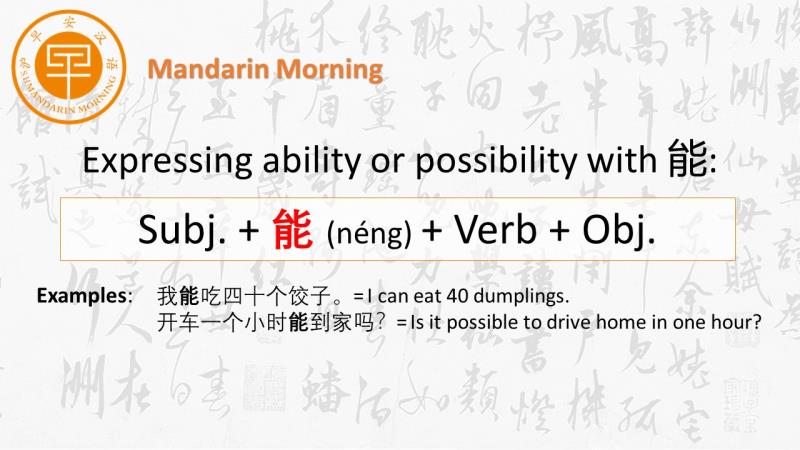能 (néng) is one of several Chinese words that is normally translated as "can" in English. However, 能 (néng) is used to emphasize one's ability or the possibility of something happening. Expressing Ability 能 (néng) indicates ability when used with activities that are not consciously learned or studied. The structure to use 能 (néng) to express "ability" is: Subj. + 能 + Verb + Obj. Examples: 我能吃四十个饺子。(wǒ néng chī sìshí gè jiaozi) = I can eat 40 dumplings. 他能工作24个小时。(tā néng gōngzuò èrshí-sì gè xiǎoshí) = He can work 24 hours. 你能帮我找到他吗?(nǐ néng bāng wǒ zhǎodào tā ma) = Can you help me find him? 你的手机能上网吗?(nǐ de shǒujī néng shàngwǎng ma) = Can your cell phone go on the internet? 一岁的宝宝能说话吗?(yī suì de bǎobao néng shuōhuà ma) = Can a one year old baby talk? Expressing Possibility When used with activities that are consciously learned or studied, 能 (néng) generally means that circumstances do not allow execution of the action. In other words, it's not possible. The structure to use 能 (néng) to express possibility is exactly the same: Subj. + 能 + Verb + Obj. Examples: 开车一个小时能到家吗?(kāichē yī gè xiǎoshí néng dào jiā ma) = Is it possible to drive home in one hour? 他们明天能早点来吗?(tāmen míngtiān néng zǎo diǎn lái ma) = Would it be possible for them to come a little earlier tomorrow? 你们能小声一点吗?(nǐmen néng xiǎo shēng yīdiǎn ma) = Could you all lower your voices a bit? 你能告诉我她的手机号码吗?(nǐ néng gàosu wǒ tā de shǒujī hàomǎ ma) = Could you tell me her cell phone number? 一千块能买一个手机吗?(yīqiān kuài néng mǎi yī gè shǒujī ma) = Is it possible to buy a cell phone with one thousand RMB? Other Usages From these examples we can see such circumstances might be pertaining to getting someone's consent or reliant on the speaker's health. If the speaker wishes to express that they are able to execute an action requiring a consciously studied skill, 会 (huì) can be used instead. Because 能 (néng) can express possibility, it is often used to form polite questions, something like "would it be possible" in English: Examples: 我能问你一个问题吗?(wǒ néng wèn nǐ yī gè wèntí ma) = Could I ask you a question? 我能坐在这里吗?(wǒ néng zuò zài zhèlǐ ma) = Could I sit here? 这里不能游泳。(zhèlǐ bù néng yóuyǒng) = You can't swim here. 上课的时候不能说英文。(shàngkè de shíhou bù néng shuō Yīngwén) = In class, you can't speak English. 工作的时候不能玩手机。(gōngzuò de shíhou bù néng wán shǒujī) = When working, you can't play with your cell phone. |